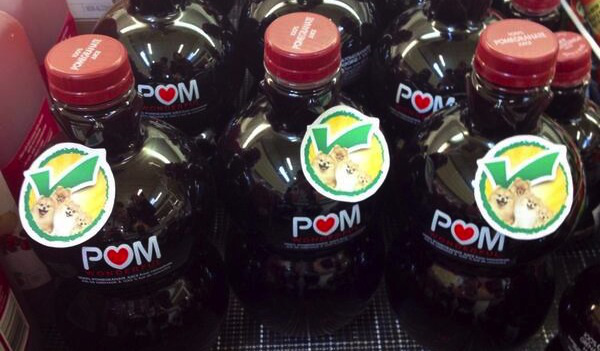POM Wonderful Tries Again To Convince Court Its Ads Aren’t Misleading

These labels saying POM contains actual pomeranians may be as accurate as its claims to curing heart disease or prostate cancer. (Photo: Twitter user @nmlehman)
The FTC has long taken issue with POM Wonderful’s ad claims, saying they go beyond merely stating generally accepted health benefits from pomegranates (i.e., that they contain certain nutrients and antioxidants). POM was accused of making statements that its juice fought atherosclerosis, prostate cancer and other specific diseases, and claimed that these statements were backed up by medical research.
Furthermore, the FTC says the research cited by POM was flawed and the company’s interpretations of the results were distorted to only highlight positive results.
In Sept. 2010, the Commission filed an administrative complaint against POM Wonderful, seeking to prohibit the company from making health benefit claims without providing independent scientific research that backed up those claims, and from making statements about disease prevention or treatment without approval from the Food and Drug Administration.
An administrative law judge subsequently agreed with the FTC that 36 different POM ads made statements that were misleading or unsubstantiated. An appeal of that decision was upheld by the FTC in Jan. 2013, barring POM from making these claims in future ads.
And so earlier this year, POM appealed to a D.C.-based Circuit Court of Appeals, arguing that most of the ads with which the FTC took issue had been stopped before 2005 and the rest were pulled in 2007. The company also contends that the FTC lacks the authority to require it produce two randomized, controlled clinical trials in order to make the claim that POM Wonderful fights specific diseases.
The two sides appeared before the court on Friday for oral arguments, and according to Reuters, things didn’t go so well for POM.
“I don’t understand if you look at those two paragraphs how you can say that it’s not misleading,” one judge stated while looking at an ad for the juice. He later stated that a disclaimer on a second POM ad “is not at all good enough.”
The one issue on which the court might side with POM is the requirement for the company to produce two independent pieces of research to back their medical claims; they voiced concern that this might result in a burdensome expense for the juice company.
It’s been a busy couple weeks for POM’s lawyers, who recently appeared before the U.S. Supreme Court in their case against Coca-Cola. In that case, POM is suing Coke over Minute Maid juices prominently labeled as “pomegranate,” but which only contain a hint of the ingredient.
This fight — along with POM’s questionable marketing history — inspired John Oliver’s new HBO show Last Week Tonight to create bogus labels pronouncing that each bottle of POM contains actual pomeranians, a fake label that also works for other products:
Want more consumer news? Visit our parent organization, Consumer Reports, for the latest on scams, recalls, and other consumer issues.

